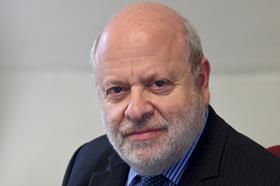The air is thick with advice for solicitors. As soon as a breath is taken - oops, down goes another report through the mouth or nose.

I am not immune from giving a bit of advice myself. Mine has recently been aimed at the big US law firms willingly agreeing to be extorted by the president (I see that the price for protection has now gone up from US$40 million to US$100 million).
At the same time, the Institute of Business Ethics has recently given advice to our City solicitors to strengthen their due diligence to avoid the government confronting them with a stricter regime and penalties, while a report published by the Legal Services Consumer Panel suggested that those same City solicitors might consider paying a levy to improve access to justice in the UK.
It goes on and on, but the message is clear: everyone has advice for us.
I think of this because I am involved in intense discussions with a group of European lawyers about what advice should be given to lawyers on a certain aspect of climate change.
Everyone in the group agrees that it is the responsibility of bars to issue guidance to lawyers on climate change. The Law Society has done so, and will soon issue a practice note on the consequences for conveyancing.
But what advice or information should be given about a phenomenon that the Law Society describes in its guidance as follows:
‘For lawyers, the most significant GHG [green house gas] emissions associated with your organisation are likely to be emissions associated with the matters upon which they advise, rather than scope one-to-three emissions … These downstream emissions are sometimes referred to as ‘scope four’ or ‘advised emissions’.
To use less technical words, advised emissions, i.e. emissions which are not caused directly by your own use of energy through your direct actions but arise rather from activities on which you advise a client, are not currently included in the standard-setting protocol for measuring greenhouse gases, though there is persistent talk (or ‘increased scrutiny’ as the Law Society puts it) around whether they should be.
Read more by Jonathan Goldsmith
Part of the scrutiny is the activism which has law firms in its cross-hairs. There are demonstrations outside law firms by those who disagree with the advice those firms give to their clients, and there is the annual survey of law firms’ advice activity on climate put out by the Law Students for Climate Accountability, which ranks big firms according to how much damage their advice is considered to inflict on the climate. The Law Students say: ‘law firms play an integral role in the evolution and outcome of our world’s climate crisis, including transactions that finance fossil fuel development, litigation that prevents climate accountability, and lobbying for the fossil fuel industry.’
Yet there are several significant problems with advised emissions. First, no-one knows how to measure them, although there are valiant efforts to do so.
And second, and maybe most importantly, the bars are vehemently against their introduction, for understandable reasons, particularly because they are based on identification of the lawyer with the client’s interest. We have seen where such identification has led in the Land of Executive Orders and Extortion of Law Firms, and it may be that the consequences of those executive orders against US law firms provide the strongest rationale for resisting the imposition of any measurement of advised emissions on law firms.
But does that then mean that law firms bear no responsibility for their advice at all?
The question at stake in our discussion is: should advised emissions be included in our guidance, even if it is only to describe what they are and how they are being discussed? Should they be included in guidance when they are not officially included in the measurement protocol, if there is no agreed way to measure them, and if they raise troubling questions around identification of the lawyer with the client’s interest?
Many people say that they therefore shouldn’t be mentioned at all. The very mention of them implies some acknowledgement, maybe even implicit acceptance, of their credibility, whereas the topic should be rejected out of hand. Mentioning them in guidance to lawyers might give others the impetus to introduce them, which they might otherwise not consider.
There are other contributors – and I am among them – who feel that it is absurd not to tell lawyers as a matter of important information that there is a current debate around advised emissions. It is perfectly possible to describe the ongoing discussions without subscribing to the idea of advised emissions ourselves; indeed, it would give us the opportunity officially to reject them and to explain why.
As with all delicate debates, there is no right answer. Maybe this is a piece of advice and information that we will never breathe in the future.
Jonathan Goldsmith is Law Society Council member for EU & International, chair of the Law Society’s Policy & Regulatory Affairs Committee and a member of its board. All views expressed are personal and are not made in his capacity as a Law Society Council member, nor on behalf of the Law Society































4 Readers' comments